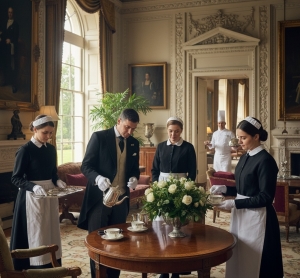Winter Energy Bills & Household Staff: Simple Ways Your Team Can Save You Money This December 2025
With UK energy prices still elevated this winter, many discerning households are looking for practical ways to reduce consumption without sacrificing comfort. The good news? Your household staff – housekeepers, chefs, nannies, and house managers – are perfectly placed to help. At Marshall Harber, we’re seeing more clients ask us to place candidates with strong energy-awareness skills. Here are the most effective, staff-led strategies that deliver real savings right now.
1. Heating Habits That Actually Work
* Lower the thermostat by just 1 °C (saves ~£100–£150 per year).
* Use programmable or smart thermostats and train staff to set “away” and “night” schedules.
* Close curtains at dusk and ensure doors are kept closed – simple habits that can cut heat loss by up to 20 %.
2. Kitchen & Laundry Efficiency
* Run dishwashers and washing machines only when full and on eco settings.
* Boil only the water needed in kettles (staff can mark fill lines inside).
* Batch-cook and use lids on pans – reduces oven and hob energy by 30–50 %.
3. Lighting & Small Appliances
* Switch to LED bulbs throughout.
* Create a nightly “power-down” checklist: unplug phone chargers, turn off standby devices, switch off unnecessary lights.
4. Draught-Proofing & Maintenance
* Housekeepers can quickly fit draught excluders, brush strips, and chimney balloons.
* Regular bleeding of radiators and cleaning of filters keeps systems running efficiently.
Why Energy Awareness Is Now a Core Skill
More and more of our clients are listing “energy-conscious” as a non-negotiable requirement when briefing us for new placements. Candidates who arrive with proven habits (such as always closing internal doors, using appliance eco-modes, or understanding smart-heating zones) instantly add value. In an era of persistently high energy prices, these small, daily disciplines are no longer optional extras; they are part of the professionalism expected from top-tier household staff.
How We Help
When placing new staff, we can now include energy-efficiency awareness in our vetting and can provide a short “Winter Savings Checklist” for existing teams. Small changes, consistently applied by trusted staff, add up to significant savings.
Make this winter warmer for your household budget – get in touch if you’d like us to match you with energy-conscious professionals.
In the grand mansions of London—from Belgravia to Kensington—household staff are the unsung heroes who keep everything running smoothly. From housekeepers ensuring pristine environments to chauffeurs navigating busy streets, their contributions often go unnoticed. At Marshall Harber, we celebrate these professionals and their vital roles in discerning homes. Here’s a closer look at how they make a difference.
The Essential Roles of Household Staff
• Housekeepers: They maintain order, from daily cleaning to managing laundry, allowing families to focus on life’s priorities.
• Chauffeurs: Beyond driving, they ensure safety and punctuality, often anticipating needs like route changes.
• Nannies and Chefs: Nannies nurture children with care, while chefs craft meals that suit dietary needs and tastes.
These roles blend skill, discretion, and dedication, forming the backbone of high-end homes.
Challenges and Rewards
Staff face long hours and high expectations, yet the rewards include stable work and meaningful relationships. For clients, the benefit is a seamless lifestyle; for staff, it’s pride in their craft. Recognizing this—through fair pay and appreciation—boosts loyalty.
Marshall Harber’s Commitment
We vet every candidate to ensure they’re the heroes your home needs. Trust us to connect you with staff who excel behind the scenes.
As autumn fades and winter approaches in 2025, UK households need to prepare for colder months. From managing heating to handling holiday demands, household staff—nannies, housekeepers, or chefs—play a crucial role. At Marshall Harber, we help clients build a winter-ready team. Here’s how to strategize for the season ahead.
Key Winter Staffing Roles
• Heating and Maintenance: Housekeepers can oversee boiler checks and insulation, ensuring warmth and safety.
• Holiday Prep: Chefs and staff can plan festive menus and decorations, easing holiday stress.
• Childcare Adjustments: Nannies can adapt to indoor activities and shorter days, keeping children engaged.
Early planning prevents winter disruptions.
Practical Strategies
• Schedule Flexibility: Adjust hours for holiday events or snow days, ensuring coverage.
• Training: Equip staff with winter-specific skills, like safe de-icing or energy-efficient practices.
• Wellness Focus: Support staff with warm breaks to combat cold weather fatigue.
These steps keep your home running smoothly.
Benefits and Considerations
• Benefits: A prepared team reduces stress and enhances home comfort.
• Considerations: Increased workloads—mitigate with clear communication and temporary support.
Marshall Harber ensures your staff are ready for winter’s challenges.
Trust Marshall Harber
Our vetting process matches you with a team tailored for winter demands. Let us help you create a resilient household this season.
As autumn settles in across the UK in 2025, the shift in seasons can impact household staff—nannies, housekeepers, or chefs—through shorter days and colder weather. Supporting their wellness is key to maintaining a harmonious home. At Marshall Harber, we prioritize staff well-being alongside client needs. Here’s how to care for your team this autumn.
Why Autumn Wellness Matters
Seasonal Affective Disorder (SAD) affects up to 3% of the UK population (NHS, 2025), with live-in staff particularly vulnerable due to limited daylight. Stress from increased workloads (e.g., school runs, holiday prep) also rises. Prioritizing wellness boosts productivity and morale.
Practical Support Strategies
• Lighting and Breaks: Encourage natural light exposure and regular breaks to combat SAD.
• Work-Life Balance: Adjust schedules to allow personal time, especially for live-in staff.
• Wellness Resources: Offer access to mental health support or autumn fitness plans.
These steps foster a supportive environment.
Benefits and Challenges
• Benefits: Healthier staff, reduced turnover, and a positive home atmosphere.
• Challenges: Time to implement changes—mitigate with clear communication and planning.
• Client Role: Active support from employers enhances trust and loyalty.
Marshall Harber’s Approach
We vet staff with wellness in mind, ensuring they thrive through seasonal shifts. Trust us to match you with a team that’s supported and ready for autumn demands.
As the new school term approaches in August 2025, discerning UK households are adjusting to autumn routines. From school runs to after-school care, household staff play a vital role in this transition. At Marshall Harber, we help clients prepare their teams for a seamless shift. Here’s how to get your staffing ready for back-to-school season.
Key Staffing Adjustments for Autumn
• School Runs and Timetables: Ensure nannies or drivers are aligned with school schedules, including pickups and extracurriculars.
• After-School Support: Housekeepers or nannies can manage homework spaces and snacks, easing family stress.
• Home Maintenance: Prepare for autumn with staff handling garden tidy-ups or heating checks.
Early planning ensures a smooth start.
Roles and Responsibilities
• Nannies: Focus on child safety, punctuality, and educational support.
• Housekeepers: Keep homes organized for busy mornings and adapt to seasonal cleaning needs.
• Chefs: Plan nutritious, quick meals to fit tighter schedules.
Marshall Harber vets staff to match these evolving roles.
Benefits and Tips
• Benefits: Reduced parental workload and a structured home environment.
• Tips: Schedule a pre-term meeting with staff to review routines, and consider temporary help for peak days.
• Challenges: Adjusting to new hours—mitigate with clear communication.
Trust Marshall Harber for the Transition
Our vetting process ensures your staff are prepared for autumn demands. Let us match you with a team that keeps your household running smoothly as school resumes.
In 2025, discerning UK households are increasingly prioritizing sustainability, and this extends to household staffing. From eco-friendly cleaning to energy-efficient meal prep, staff play a key role in green living. At Marshall Harber, we’re embracing this shift, helping clients and candidates adopt sustainable practices. Here’s how eco-friendly staffing is shaping the future.
Why Eco-Friendly Staffing Matters
With climate concerns rising, 62% of UK households aim to reduce their carbon footprint (ONS, 2025). Staff—nannies, housekeepers, or chefs—can lead this change by using biodegradable products, minimizing waste, and optimizing energy use, aligning with client values and regulatory pushes like the 2050 net-zero target.
Green Practices for Household Staff
• Cleaning: Switch to vinegar-based cleaners and reusable microfiber cloths, reducing plastic waste.
• Meal Prep: Use seasonal, local ingredients and energy-efficient appliances to cut emissions.
• Daily Habits: Encourage water conservation and recycling, embedding sustainability into routines.
Training staff in these practices ensures consistency and impact.
Benefits and Challenges
• Benefits: Lower environmental impact, cost savings on utilities, and enhanced client satisfaction.
• Challenges: Initial costs for eco-products and staff training time.
• Solutions: Marshall Harber vets candidates with green skills, easing the transition for clients.
Marshall Harber’s Commitment
We’re matching eco-conscious households with staff trained in sustainable methods. Our personalized vetting process ensures your team reflects your green goals, making 2025 a year of responsible living.
Since the UK’s departure from the EU, staffing discerning homes with EU nationals has transformed. Brexit ended free movement in 2021, shifting how London and UK households hire housekeepers, nannies, or chefs from Europe. At Marshall Harber, we’ve adapted to these changes, offering expert guidance to clients navigating this legacy. Here’s what you need to know about employing EU staff in 2025.
Brexit’s Impact on EU Staffing
Pre-Brexit, EU nationals made up 29% of UK migration; by 2025, this has dropped as non-EU immigration rose to 79%. Free movement is replaced by visa requirements, with many EU workers needing settled status (deadline 30 June 2021) or new visas. This shift has reduced the pool of available EU talent, prompting a reliance on alternative recruitment strategies.
Visa and Legal Requirements
• Settled Status: EU nationals living in the UK before 31 December 2020 can apply for settled status, allowing them to work without visas.
• Skilled Worker Visa: Required for new EU hires, needing a sponsor license, a job offer, and a minimum salary (£38,700 in 2025, rising to £41,700 in July).
• Right-to-Work Checks: Mandatory, with fines up to £60,000 per illegal worker.
Existing EU staff can stay, but new hires face stricter rules, impacting roles like live-in staff.
Pros, Challenges, and Strategies
• Pros: EU nationals often bring diverse skills and cultural alignment with UK homes.
• Challenges: Visa costs, language requirements (B1-B2 English), and reduced availability.
• Strategies: Partner with a specialist agency like Marshall Harber to vet candidates and manage compliance, ensuring a smooth hiring process.
Expert Support from Marshall Harber
Brexit’s legacy requires careful navigation. Our team meets every candidate, verifying their status and skills to match your discerning household needs. Trust us to bridge the gap left by these changes.
For discerning households in London and the UK, choosing between live-in and live-out staff is a pivotal decision. Whether you need a nanny, housekeeper, or chef, the arrangement impacts your home’s dynamics, budget, and staff satisfaction. At Marshall Harber, we understand these nuances and help clients and candidates find the perfect fit. Let’s explore why clients choose each option, the differences in roles, and the pros, cons, perks, and trade-offs from both client and candidate perspectives.
Reasons for Choosing Live-In or Live-Out Staff
Clients opt for live-in staff for round-the-clock support, ideal for busy families or estates needing constant care. Live-out staff suit those preferring independence or part-time help. A client in Kensington might choose a live-in nanny for young children, while a Mayfair homeowner might prefer a live-out chef for flexible dinner services. Candidates, meanwhile, may prefer live-in roles for accommodation or live-out for work-life balance.
Differences in Roles and Responsibilities
Live-in staff are often on call, managing tasks like overnight child supervision or estate maintenance, with accommodation provided. Live-out staff work set hours, focusing on specific duties (e.g., daily cleaning or meal prep) and commuting home. The distinction affects availability—live-in staff offer immediacy, while live-out staff provide boundaries, shaping the household’s routine.
Pros & Cons
Client Perspective:
Live-In: Pros include 24/7 availability and reduced commuting logistics with seamless support; cons involve less privacy and higher accommodation costs as well as space and boundary management.
Live-Out: Pros include privacy, flexibility and cost efficiency; cons are limited availability outside of hours and include scheduling challenges.
Candidate Perspective:
Live-In: Pros include free housing and job security with a sense of community within the home; cons are limited personal time and may include isolation from friends and family.
Live-Out: Pros include personal freedom and family time with more work-life balance; cons are commuting costs and may include less job stability.
Finding the Right Fit with Expert Guidance
Whether live-in or live-out, the key is alignment with your household’s needs. Vetting ensures reliability—Marshall Harber meets every candidate, matching their preferences and skills to your requirements. This tailored approach helps you navigate these nuances for a harmonious home.
In today’s discerning homes across London and the UK, the demand for versatile household staff is on the rise. Hybrid roles—such as a housekeeper-chef or a nanny-driver—offer a practical solution for busy families seeking efficiency without sacrificing quality. These multi-skilled professionals are reshaping private staffing, and vetting them requires a new approach. At Marshall Harber, we’re experts in identifying and matching candidates with the right combination of skills—here’s how to navigate this evolving trend.
Understanding Hybrid Roles in Household Staffing
Hybrid roles combine traditional duties into a single position, tailored to modern needs. A housekeeper-chef might maintain your home while preparing gourmet meals, while a nanny-driver could care for children and handle school runs. This trend reflects the desire for streamlined staffing in discerning homes, where space or budget constraints make multiple hires less feasible. Identifying which hybrid role suits your lifestyle—perhaps a butler-gardener for a country estate—is the first step.
Vetting for Versatility and Reliability
Vetting hybrid staff goes beyond standard checks. Assess their proficiency in each skill set through practical demonstrations—ask a housekeeper-chef to cook a meal and clean a room, or a nanny-driver to manage a child’s schedule and drive safely. Verify references from past roles that required similar multitasking, ensuring consistency. At Marshall Harber, our consultants meet candidates, evaluating their ability to juggle multiple responsibilities with professionalism and care.
Practical Tips for Hiring Hybrid Staff
- Test Multi-Skills: Request a trial day to observe how they handle combined duties, revealing their true versatility.
- Clarify Expectations: Define priorities (e.g., cooking over cleaning) to avoid role confusion.
- Check Experience: Seek candidates with proven hybrid roles, not just separate skill sets.
- Rely on Specialists: A modern home staffing UK agency like Marshall Harber can source and vet hybrid talent efficiently.
Embrace Efficiency with Hybrid Staffing
The rise of hybrid roles offers a smart way to meet the demands of modern households. By understanding your needs, vetting for versatility, and partnering with experts, you can build a flexible, reliable team. Trust in specialized recruitment to bring these innovative solutions to your home.
For discerning households in London and across the UK, a private chef is more than a luxury—it’s a key part of daily life and special occasions. But finding the right culinary talent means matching their skills and style to your family’s unique tastes. Whether you prefer gourmet French cuisine, health-conscious meals, or international flavors, the process requires careful consideration. At Marshall Harber, we specialize in pairing households with chefs who elevate their dining experience, and here’s how you can ensure the perfect fit.
Defining Your Culinary Preferences
Start by identifying what defines your household’s taste. Do you value organic, locally sourced ingredients for sustainability? Are your children fans of kid-friendly yet nutritious dishes? Or perhaps you host frequent dinner parties requiring elegant, multi-course menus? Pinpointing these preferences—whether it’s a love for Italian classics or a focus on dietary restrictions—sets the foundation for finding a chef who aligns with your vision. For example, a family in Mayfair might seek a chef skilled in fine dining, while a countryside estate may prefer rustic, seasonal cooking.
Assessing Culinary Style During Hiring
Once your preferences are clear, evaluate candidates through targeted steps. Request a trial menu or tasting session to sample their cooking firsthand—this reveals their creativity and ability to adapt to your tastes. During interviews, ask about their experience with specific cuisines or dietary needs, and review their professional portfolio, including past menus or client feedback. At Marshall Harber, our consultants meet every chef candidate, ensuring their culinary style matches your household’s expectations through detailed discussions and reference checks.
Practical Tips for a Perfect Match
- Trial a Menu: Invite the chef to prepare a meal tailored to your preferences, observing their approach and the results.
- Discuss Flexibility: Ensure they can adapt to special diets or last-minute guest requests, a key trait for private homes.
- Check References for Taste: Ask past employers about the chef’s ability to cater to specific culinary styles and household dynamics.
- Leverage Expertise: A household chef London agency like Marshall Harber can streamline this process, connecting you with pre-vetted chefs who fit your taste profile.
Elevate Your Dining with the Right Chef
Matching a private chef’s culinary style to your household’s taste transforms mealtimes into a personalized experience. By defining your preferences, assessing candidates thoughtfully, and seeking specialist support, you can hire a chef who not only cooks but also enhances your family’s lifestyle. Trust in a tailored hiring guide to bring the perfect culinary partner to your table.














